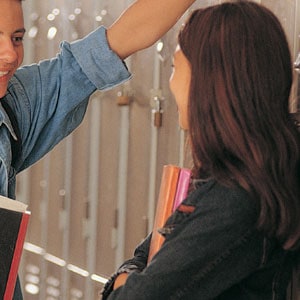
Spiritual Growth in the Teen Years
How can parents pass on their faith to their children? Listen today to hear siblings Samuel Rainey and Rebecca (Rainey) Mutz, along with their proud parents, Dennis and Barbara, talk about the experiences that helped them mature in faith.
Show Notes
About the Host
About the Guest
-
How can parents pass on their faith to their children? Listen today to hear siblings Samuel Rainey and Rebecca (Rainey) Mutz, along with their proud parents, Dennis and Barbara, talk about the experiences that helped them mature in faith.
-
Dave and Ann Wilson
Dave and Ann Wilson are hosts of FamilyLife Today®, FamilyLife’s nationally-syndicated radio program. Dave and Ann have been married for more than 38 years and have spent the last 33 teaching and mentoring couples and parents across the country. They have been featured speakers at FamilyLife’s Weekend to Remember® marriage getaway since 1993 and have also hosted their own marriage conferences across the country. Cofounders of Kensington Church—a national, multicampus church that hosts more than 14,000 visitors every weekend—the Wilsons are the creative force behind DVD teaching series Rock Your Marriage and The Survival Guide To Parenting, as well as authors of the recently released book Vertical Marriage (Zondervan, 2019). Dave is a graduate of the International School of Theology, where he received a Master of Divinity degree. A Ball State University Hall of Fame quarterback, Dave served the Detroit Lions as chaplain for 33 years. Ann attended the University of Kentucky. She has been active alongside Dave in ministry as a speaker, writer, small-group leader, and mentor to countless wives of professional athletes. The Wilsons live in the Detroit area. They have three grown sons, CJ, Austin, and Cody, three daughters-in-law, and a growing number of grandchildren.
-

Dennis and Barbara Rainey
Dennis and Barbara Rainey cofounded FamilyLife®, a ministry of Cru®. Their 43+ years of leadership enabled FamilyLife to grow into a dynamic and vital ministry in more than 109 countries. Together they have spoken at over 150 Weekend to Remember® marriage getaways and authored or co-authored more than 35 books, including best-selling Moments Together for Couples, Staying Close, A Symphony in the Dark, and Barbara’s most recent, Letters to My Daughters: The Art of Being a Wife...more
Rebecca (Rainey) Mutz
Rebecca (Rainey) Mutz and her husband Jake live in Colorado with their children. Besides writing, she loves to cook, bake, decorate, read, and enjoy the beauty of the great outdoors. Rebecca shares openly shares the story of her grief, healing, and hope in regards to her children Molly Ann, Micah William, and two others lost through miscarriage. Jake and Rebecca Mutz hope to use their daughter Molly’s life as a way to share Christ with others and bring glory to God. Rebecca co-authored a boo...moreSamuel Rainey
Samuel Rainey is a professional counselor primarily working with couples, men, and women addressing issues of sexuality, emotional health, relationships, and spirituality. He is the co-Author of So You Want to be a Teenager with Thomas Nelson. He earned his Masters in Counseling Psychology from The Seattle School of Theology and Psychology in Seattle, Washington. When he is not roasting coffee, tending to his garden, or playing golf, he blogs about life process, parenting, and relationships at S...more
How can parents pass on their faith to their children?
Spiritual Growth in the Teen Years
Samuel: I definitely think that my parents instilled a very strong sense of faith in my life as well as my brother and sisters' lives, and I think that it was probably when I was 15 or 16 that I experienced the first tragedy of life, and I had to have a response that was my own faith.
Bob: This is FamilyLife Today for Wednesday, June 20th. Our host is the president of FamilyLife, Dennis Rainey, and I'm Bob Lepine. Is your teenager still hitchhiking on your faith or has he made his faith his own?
And welcome to FamilyLife Today, thanks for joining us on the Wednesday edition. Somewhere between the time a child is eight or nine years old and the time a child is 14 or 15 years old, something happens. I guess a lot happens in that time, but the thing I'm thinking of particularly is that the child who, at eight or nine, wanted nothing more than to please mommy and daddy.
Dennis: They're so sweet during that age.
Bob: "Yes, Mommy."
Barbara: They love Mommy and Daddy.
Bob: "I love you, Mommy."
Dennis: It's the golden years.
Bob: Yes. All of a sudden, by the time that child is 13, they can't stand you, Mommy, and they don't care what you think, Mommy and Daddy, you are ruining their lives. Have you ever heard that before?
Barbara: I do think I've heard that phrase before – "You are ruining my life." I'm not sure which one, but I do think we heard it.
Dennis: Which one? I was going to guess whether it was all six.
Barbara: All of them?
Samuel: Who didn't say that?
Barbara: Who didn't say that? Well, maybe that's true.
Bob: We have in the studio with us today in addition to our host, Dennis Rainey, his wife, Barbara Rainey, who has heard that said on more than one occasion, right, "You are ruining my life."
Barbara: That's correct.
Bob: And two of the perpetrators of that statement – do you ever remember saying to your mom?
Samuel: Not I, not I.
Bob: This is Samuel Rainey, who we need to hook up to a polygraph machine.
Samuel: The deceived.
Bob: That's right – and Rebecca Rainey – do you ever remember saying, "You are ruining my life?"
Rebecca: I'm sure I did, yeah.
Bob: You felt it, didn't you?
Rebecca: I felt it.
Dennis: Actually, there was an evening – I'll never forget this, when Rebecca walked into our bedroom, and she was feeling the restraints of the teenage years pretty intensely, and I remember looking at our bed. We have a four-poster bed, and I said, "Rebecca, it's as though you're in one corner of a boxing ring, there is an enemy in another corner of the boxing ring, and, Rebecca, we are in your corner."
Rebecca: Yeah, right.
Bob: Excuse me, what was that?
Rebecca: I said, "Yeah, right." At least that's what I thought at the time.
Samuel: Is this a current "Yeah, right?"
Rebecca: That was a previous, "Yeah, right."
Dennis: But the way a teenager views it is that the parents are in an opposing corner and that they are fighting their parents for life.
Barbara: And that the parents are the enemy.
Dennis: Yeah, rather than the parents being viewed as coaches, life coaches, who come alongside a teenager to say, "Here is how you handle the traps, the enemies, the temptations that you're going to face as a young person."
Bob: Well, amazingly enough, the four people here with me in the studio, the Ruiners, the ones who ruined the lives of their teenagers, and the former teenagers who actually didn't turn out all that bad.
Dennis: Oh, no, their lives are ruined now.
Bob: They don't look that ruined to me. All of a sudden …
Rebecca: It's hopeless.
Bob: These four have somehow collaborated on a book called "So You Want to be a Teenager." Whose idea was this, Samuel, that you guys get together and write a book, do you remember?
Samuel: Yeah, I think it was my dad's.
Bob: He suggested that you all sit down together and write?
Samuel: I just think he wanted something in writing from his two kids – something.
Bob: Something where you would say, "Okay, maybe you didn't do such a bad job, after all, right?
Samuel: Exactly, yeah.
Dennis: Actually, the reason I decided we needed to get this was I had just finished teaching my sixth grade Sunday school class for the last time. I taught it for 11 years, had about 600 young people that went through my class. I might say that I survived the 600, might be how I would say it.
But I wanted to make sure we took some of the illustrations, the stories that we use to teach these preteens how to anticipate their teenage years and to get them in writing. But instead of Barbara and I writing the book, instead turn it over to Samuel and Rebecca who just finished going through their teenage years and who could speak the language of young people today in a far more relevant manner.
Bob: So the book is designed really to hand off to a 10-, 11-, 12-, 13-year-old and say, "Read this and maybe you'll get a clue on what's ahead?"
Samuel: Rebecca, do you think if you'd had this book when you were 12 years old, things might have been any different during your teenage years?
Rebecca: I think they would have been.
Bob: How?
Rebecca: I think I would have been a little more informed – not that my mom and dad didn't inform me well enough, but I think I would have had a better idea of what they were trying to prepare me for.
Samuel: I think the book comes alongside the parents really well and reinforces what the parents say, and allows the preteen or the teenager to hear it from somebody else thus reinforcing what the parent had been talking about.
Bob: When I asked my son, Jimmy, if he would read this book and then paid him to do it, just to make sure, and I did exactly what you said, Dennis. I negotiated a price and asked for a one-page report on the book, and I was wondering if he was going to say, "Yeah, yeah, this is a book that says the same stuff you've been trying to tell me, and I don't agree with it, either."
But instead he came back and said, "It's pretty good. It's got some pretty good stories." He said, "Samuels' jokes are a little corny, but the rest of it's pretty good."
Dennis: And some of the feedback we received from the young people who read it was really cute. They'd write on the chapter on the birds and the bees. We have a chapter for the boys that is written by me, and a chapter for the girls that's written by Barbara, and as we gave the manuscript to these young people to read, they'd write back at the end of the chapter, they'd write their critique. They'd go, "This is weird. This is real weird."
But the good thing is they can read about what sex is and how sex applies to them and then in later chapters, as we talk about how far you're going to go with the opposite sex and about the whole issue of dating, we help them and their parents have some common ground to be able to discuss this. And we actually conclude the book with a number of commitments, and there are actually 12 separate commitments at the end of the book that a young person can affix their name to, and the idea for this came from walking into a pastor's office who was the leader of a very, very large church, and I noticed in the waiting area outside of his office, a small note card that had been signed by him when he was in a Sunday school class when he was 12 years old.
And the note card said, "I won't smoke, I won't drink, I won't have sex," it had a couple of other commitments in there, and then it was signed – his name. And it was dated, and it was a Sunday school class he'd attended as a young lad, and he told me, as an adult, that that commitment kept him out of the ditch and away from temptations that would – well, could have destroyed his life as a young person.
And so this book actually includes 12 separate commitments for a young person to make prior to their adolescent years.
Bob: And those commitments, I would imagine, most of these pre-adolescents aren't even thinking about much of this stuff during that time. I mean, I remember when I was 11 and 12 years old, I wasn't thinking about stuff teenagers did, I was still thinking about stuff kids did, you know? And so for a 12-year-old to read through some of these commitments and go, "Well, of course, I don't want to do that. That would be a foolish thing to do." Barbara, they don't realize how close they are to a wave of temptation that's going to move them more in this direction.
Barbara: I just remember at 11 and 12 just thinking it was going to be fun. And so to think that there would be real serious consequences or to think that there would be real issues was the furthest thing from my mind because at 11 and 12, all I wanted to do was be grown up and have fun and do what I saw other kids apparently – at least on the outside – doing that looked like it was fun.
So I think the commitments are a great idea to bring some levity and some seriousness to this whole journey that they're getting ready to embark on.
Bob: And the commitments that you've included in the book really deal with the core issues young people are going to face as they had through the teenage years. The first commitment that the young people are asked to sign is a commitment that says, "I will make Jesus both Savior and Lord of my life and serve and love Him joyfully with all my heart, my soul, and my mind." There's commitment number one – it's about your relationship with Christ.
And I have to ask the two who are nearest to their teenage years here, there does seem to be something that happens in the lives of many teenagers where the faith they've grown up with all of a sudden moves to a new level. It gets tested and tried, and it either derails or it gets stronger. Do you remember a time, Samuel, when you had to really personally embrace your faith as your own? You couldn't just hitchhike off what you'd learned in your family growing up?
Samuel: Yeah, I definitely think that my parents instilled a very strong sense of faith in my life as well as my brother and sisters' lives, and I think that it was probably when I was 15 or 16 that I experienced the first tragedy of life, and I had to have a response that was my own faith and it wasn't from my parents.
Bob: That's when you were diagnosed with muscular dystrophy?
Samuel: Muscular dystrophy, that's right, yeah.
Bob: And the form of muscular dystrophy that you have is something called Charcot-Marie-Tooth syndrome, right?
Samuel: Correct, yeah, that's right.
Bob: It keeps you from being able to lift the front part of your foot up and so you wind up kind of walking flat-footed.
Samuel: Yes, some people have kind of correlated that to the way a duck would walk.
Bob: Okay, how did that challenge you at age 15?
Samuel: Well, I'll tell you what, the one thing that really hit me hard was the fact that I'm in the prime of my teenage years and the prime of being able to have fun and to participate in sports, in high school sports, and other things, and having that taken away, that really just kind of kicked my psyche a lot, and to think that probably for the rest of my life I'd never be able to participate in sports again or never be able to run and to jump and to play with friends in that manner was pretty devastating. And I really think that's when my faith took a turn for the good, because it allowed me to pursue God with my heart outside of pursuing it from my parents.
Dennis: There was a time when I was attempting to console Samuel and add some perspective – we were on our way back from town in a 15-minute drive at the twilight, and I was doing my best to comfort him and felt like my words were falling short, and he ended up comforting me. Do you remember what it was you said, Samuel?
Samuel: I do. I remember it was very shortly after we had been to the doctors and the physical therapists and been formally diagnosed with having muscular dystrophy and just a very confusing time that was, and I remember driving home with my dad, and he was just talking to me, and I paused for a second after a question, and I thought, and I said, "You know what, Dad? I don't need legs to serve God."
And I would probably say that's when my dad and mom realized that it wasn't their faith that I was living out, but it was my faith that I was living out.
Dennis: And I think as we prepare our young people for life, I don't think many parents are thinking about preparing them for a devastating illness, a disease that is going to eliminate their ability to run and jump and participate with friends. But none of us know what's ahead, what's around the corner. We are commanded, as parents, to equip our sons and daughters to walk with God so regardless of the news they hear, they have a faith formulated in their souls that they can begin to plug into and, you know, if we would have started building Samuel's faith at the point he got the bad news, his response could, in no way, have been what he said to me at that point – "Dad, you don't have to have legs to serve God."
That really points out the all-important responsibility that we have as moms and dads to just keep on building, keep on teaching the Scriptures, keep on modeling, keep on praying for our children, and let the Lord ultimately create the conviction in their hearts.
Bob: Rebecca, I remember when I was in high school, I was part of a youth group, and there were probably 30 or 40 of us, all of us pretty faithful in our attendance, pretty good kids, you know, we were the kids who didn't do the bad stuff, and school leaders, and that kind of stuff.
After I graduated from college, I looked back at those who had been a part of that youth group, and of 30 kids who had been in that group, there were maybe five who were still faithful in walking with the Lord. Something happened along the way to derail a lot of those kids who, in high school, had said, "I want to follow Jesus."
When was it that you recognized in your own life, this has got to be more than just what Mom has taught me all along and what Dad has said is true?
Rebecca: I would say that I made my faith my own in 8th or 9th grade, but it wasn't until probably 12th grade, my senior year, when I decided to really embrace the faith and to make it my own. I made a lot of decisions before I went to college with my roommate. We weren't going to see R-rated movies – that was one of our big ones. But we made little rules for our room and some other things, but I just remember I felt very good about stepping out into college with what I was armed with.
Bob: Because, all of a sudden, it wasn't going to be up to Mom and Dad what you got to do.
Rebecca: It was up to me.
Dennis: And I just want to underscore there will come a point when it is up to the child. We can't control that. A young man I want to brag on at this point, whose name is Mark, was raised in a Christian family, and his mom and dad were leading him in his own faith, and there came a point early in his teenage years where a bottle of whiskey was shoved in front of his face, and he said, "I remember looking at the other guy and saying, 'No, thanks'" – pushing away, and he said it cost me a friendship with that group of people.
And he had another close friend who didn't push away but who kept on hanging out with that group that was off into that stuff, and by the time his senior year rolled around, he said, "I would walk through the halls, and the other guy who used to be one of my closest friends wouldn't even make eye contact with me." And he said, "Later on in college my friend came to me, and he'd been off into cocaine, serious drugs," and said to Mark, he said, "You know that decision you made? I always had the highest respect for you as a young person because of a choice you made."
And that's what we, as a parent, that's what it's all about, Bob. We are trying to so instruct them in the ways of Scripture that when we're not looking, when we're not there, when it's just God and them, they make a choice that says yes to God and yes to the obedience of Scripture, and no to the temptations of the world.
Bob: Barbara, when you're raising your children through the teenage years, you sometimes look at each other as parents and go, "Are these kids really Christians?" I mean, we know that they grew up in church, and they've said, "Yes, I believe that," and they prayed a prayer and maybe they've been baptized and, all of a sudden, you see the selfishness, and you go, "That's incompatible with genuine faith in Christ." Did you ever wonder that about your kids as they were growing up?
Barbara: Yeah, we've wondered it about all of our kids, and I think a wise parent is going to evaluate that, because you don't know, for sure, when a child is four or five years old, and they say they want to invite Jesus into their heart, if they're doing it to please Mommy and Daddy, or if they're doing it because they sincerely believe and understand the issues.
And so you have to watch your child as they grow up, and there may be some times when you have to have conversations, and you have to push back, so to speak, and say, "Do you think you really are a believer? Do you think you really do know the Lord?" And we've had a couple of those conversations with a couple of our kids during their teenage years when we said, "The situation that you're in right now – do you think you're there because God wants you to be there or because you want to be there? And if it's you, is it because you're running your life or is it because you're not allowing Christ to run your life?"
And I think parents need to be sensitive to that and need to be watching for that, because I think it's very possible for kids to grow up in a Christian home and think that they are believers when, in fact, they may not be.
Dennis: When Ashley was – well, somewhere around 9, 10, 11, we put before her the need to sign a commitment saying that she was going to love God, and she was going to make him her Master, her Lord.
And it's interesting, Bob, we put that in her safety deposit box, and that remained there for a number of years, and we fished that out. Those handwritten documents that are signed by a young person, I think are extremely important for – well, for the child, first of all, but also for the parent, too, to go back to commitments and pledges that a young person makes, and it's why we list these 12 at the end of the book for young people because I think young people today need to be challenged to put their name, to put their commitment, to put their pledge before God and to stand for something.
Bob: Well, and there's no random order to this, either. The fact that this first commitment in the book, "So You Want to be a Teenager," is "I will make Jesus both Savior and Lord of my life and serve and love him joyfully with all my heart, soul, and mind." You sign that and date that, number one, because everything else is going to tie into that pledge, right?
Dennis: Right, and I wish we'd done that for all six of our children. I don't know why we did it for Ashley and for none of the rest of our children, but we didn't. I wish we'd had this discipline for each of our children before they move into their adolescent years.
Bob: Well, and we hope there will be a lot of parents who will get a copy of the book, "So You're About to be a Teenager," and pass it on to a 10-year-old, 11-year-old, 12-year-old, 13-year-old, and then when your son or your daughter is done reading it, and when you have them write out a book report for you and say, "Here is what I thought about the book," when you settle up on whatever you're going to pay them to read the book – and we talked this week about how you can go ahead and employ your children to read this book, you hire them to do it.
But one of the requirements of this employment agreement ought to be that together you turn to the back pages here, and you say, "Now, were you going to sign this part? Why don't you just go ahead and sign what it says here on these pages and review it with them together." This is a good accountability tool with your preteen as they move into the teenage years.
We've got copies of the book, "So You're About to be a Teenager," in our FamilyLife Resource Center. This is designed for your children to read as they head into the adolescent years. The book that we've designed for you to read is the book called "Parenting Today's Adolescent," written by Dennis and Barbara Rainey, that gives you a heads up on the issues you're going to be facing as your children move through the teen years.
And then there is also information on our website about the resource Passport to Purity, which thousands of moms and dads have used with their sons and daughters. This is a resource that allows you to have a weekend getaway with your son or your daughter right before the teenage years, and if you missed it, you can still do it in the early parts of the teenage years to help you get on the same page about issues related to peer pressure and dating and other issues with the opposite sex and the kinds of issues that teenagers are going to be facing.
Again, the Passport to Purity resource, the book, "Parenting Today's Adolescent," and the book for preteens called "So You're About to be a Teenager," are all available in our FamilyLife Resource Center. Go to our website, FamilyLife.com, click the red button that says "Go," right in the middle of the screen, or call 1-800-FLTODAY. That's 1-800-358-6329. Someone on our team can let you know how you can get these resources sent to you and then make plans this summer for your preteen to read through this book or for the two of you to get away for one of these Passport to Purity getaway weekends.
Again, our toll-free number is 1-800-FLTODAY. You can also order online at FamilyLife.com.
I should also mention here if you have a teenage daughter or an about-to-be-a-teenage daughter, you may want to get a copy of the book Dennis has just written called "Interviewing Your Daughter's Date," and this month we'd like to send it to you as a thank you gift when you help support the ministry of FamilyLife Today with a donation of any amount.
We've heard from a lot of our listeners who have not only appreciated this book but are starting to put the book to use in their home, and that's exciting. Again, we'd like to send you a copy of the book as our way of saying thank you this month when you help support the ministry of FamilyLife Today.
We are listener-supported, and it's donations from folks like you that have made today's program possible and that keep us on the air in this city and in other cities all across the country. So if you can help with a donation of any amount this month, be sure to ask for a copy of the book, "Interviewing Your Daughter's Date."
If you're filling out the donation form online, when you get to the keycode box, just type in the word "date," and if you're making your donation over the phone at 1-800-FLTODAY, mention that you'd like a copy of Dennis's new book, "Interviewing Your Daughter's Date." We're happy to send it to you, again, as our way of saying thanks for standing with us and being a financial partner in the ministry of FamilyLife Today. We appreciate you.
Well, tomorrow we want to talk about limits and curfews and boundaries and how you establish those as a parent and how you hold to that during the teen years. I hope you can be with us for that.
I want to thank our engineer today, Luke Stevens, and our entire broadcast production team. On behalf of our host, Dennis Rainey, I'm Bob Lepine. We'll see you back next time for another edition of FamilyLife Today.
FamilyLife Today is a production of FamilyLife of Little Rock, Arkansas, a ministry of Campus Crusade for Christ.
_______________________________________________________________
We are so happy to provide these transcripts for you. However, there is a cost to transcribe, create, and produce them for our website. If you've benefited from the broadcast transcripts, would you consider donating today to help defray the costs?
Copyright © FamilyLife. All rights reserved.
www.FamilyLife.com





